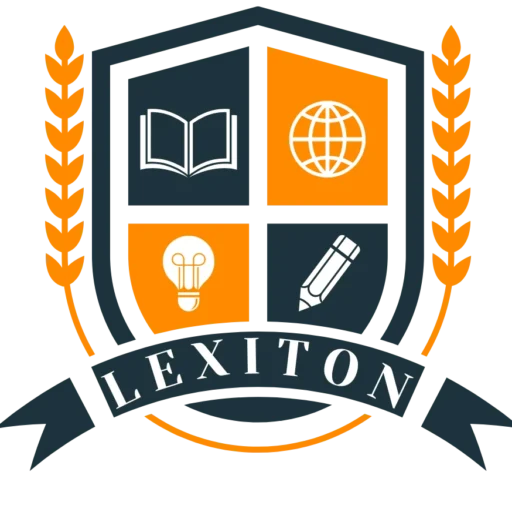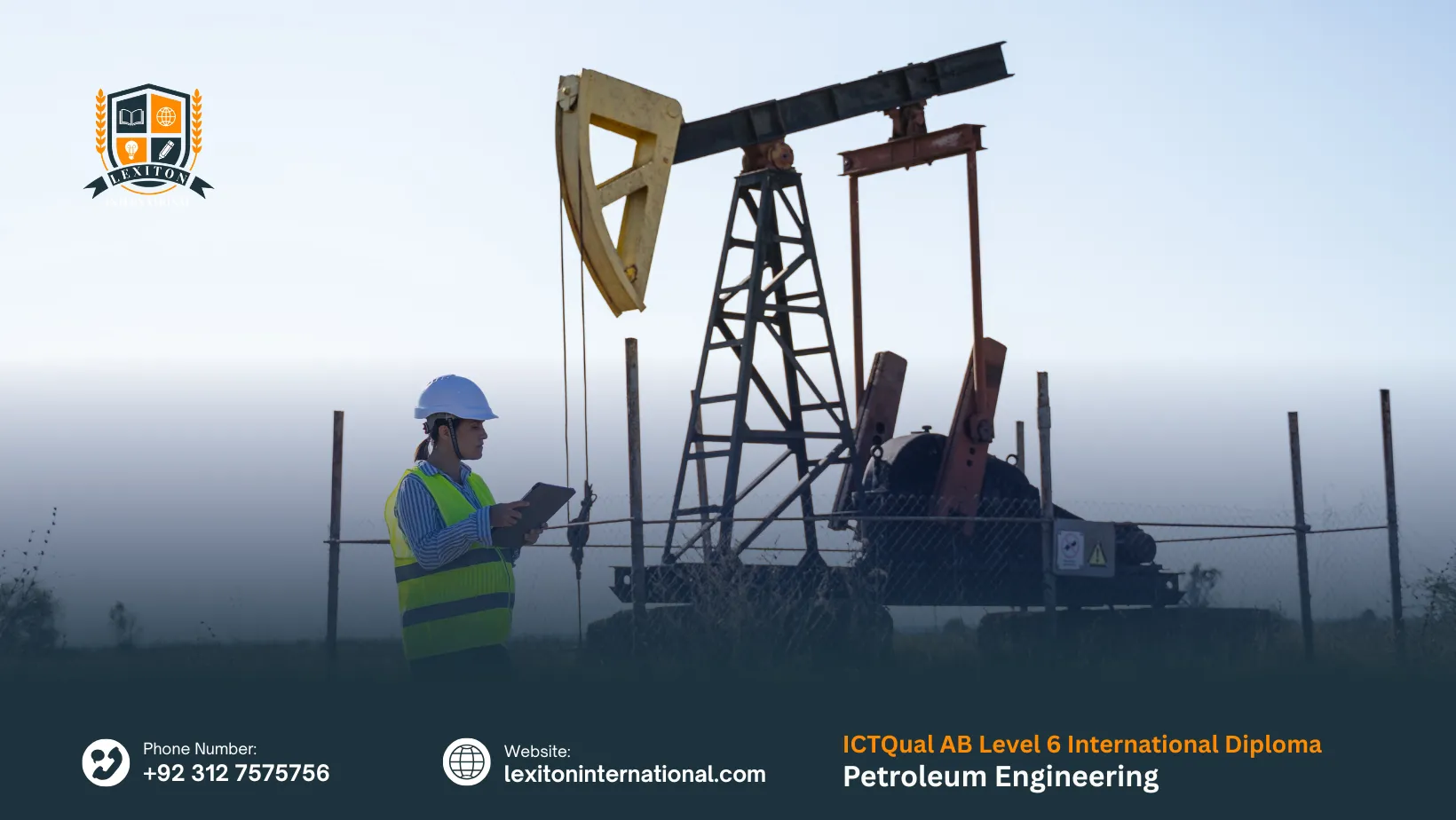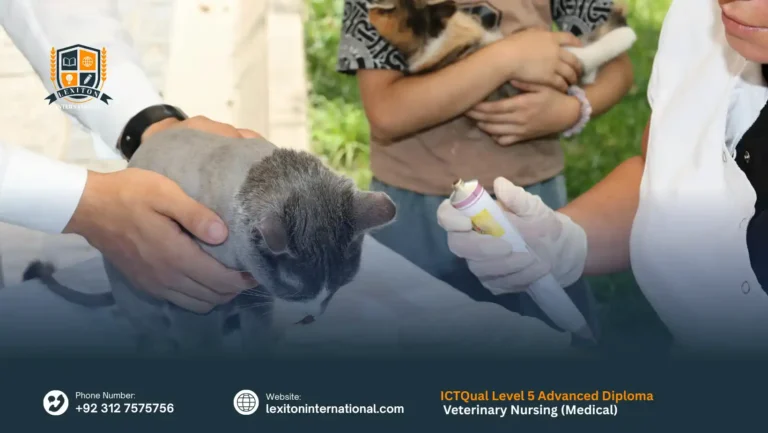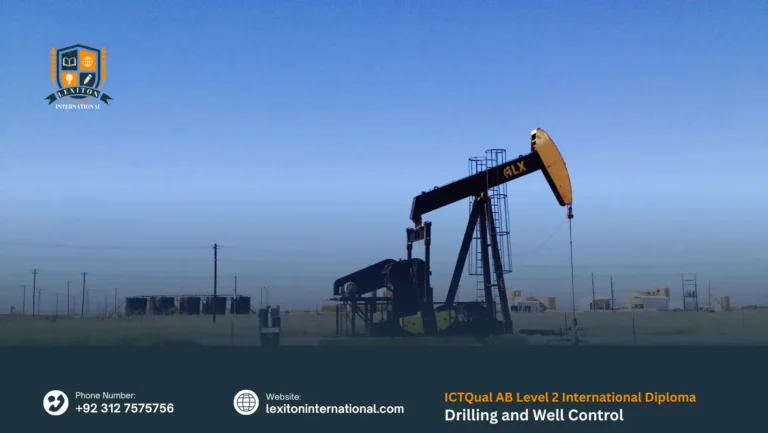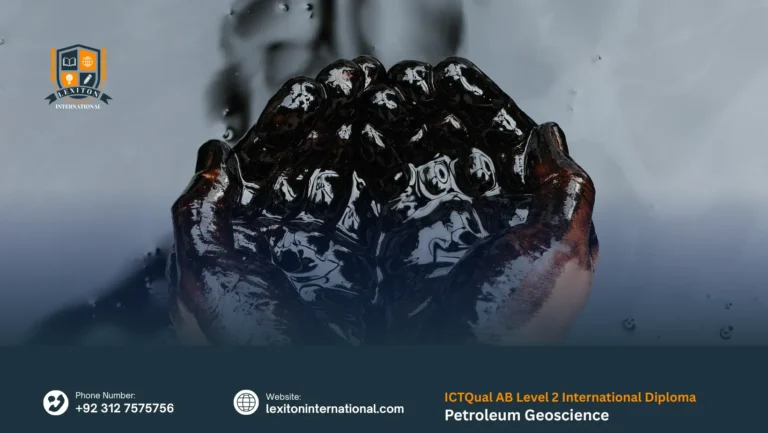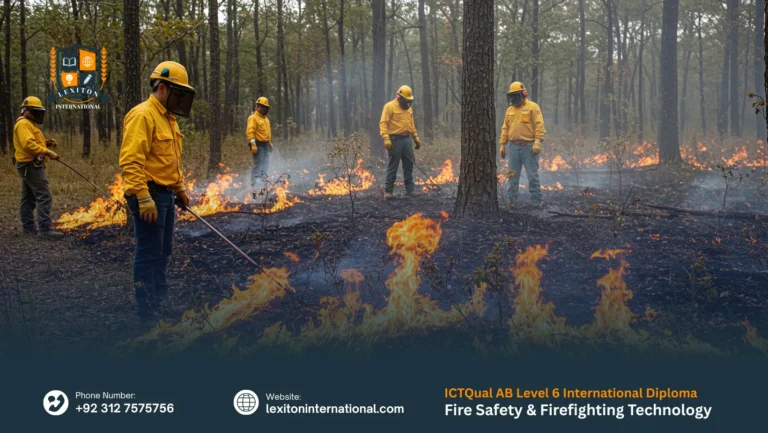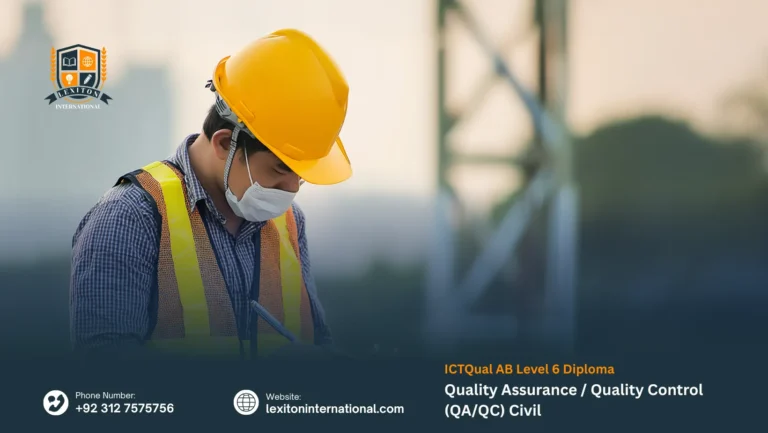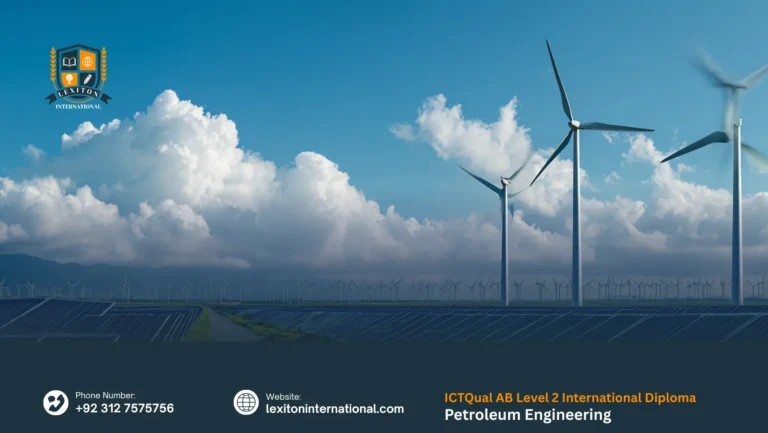The ICTQual AB Level 6 International Diploma in Petroleum Engineering is a specialized qualification designed to provide learners with advanced knowledge and practical skills in the exploration, extraction, and production of petroleum resources. This program equips participants with a strong foundation in petroleum geology, drilling engineering, reservoir management, and production technology, preparing them to meet the technical and operational demands of the global oil and gas industry.
Through a combination of theoretical learning and applied case studies, learners will gain expertise in modern petroleum engineering practices, including drilling operations, well completion, enhanced oil recovery, and safety management. The course also emphasizes the importance of environmental sustainability, regulatory compliance, and the integration of innovative technologies to improve efficiency and reduce risks in petroleum operations.
Graduates of this diploma will be well-prepared to pursue careers in upstream and downstream sectors of the oil and gas industry, working in roles such as petroleum engineer, drilling supervisor, reservoir engineer, or production manager. With its international recognition, the qualification also provides a pathway for further academic progression into postgraduate studies or professional certifications, making it an excellent choice for those seeking to advance their careers in the energy sector.
To ensure learners can fully benefit from the ICTQual AB Level 6 International Diploma in Petroleum Engineering, candidates are expected to meet the following entry requirements:
- Educational Background: Applicants should hold a Level 5 qualification (such as a diploma or equivalent) in Engineering, Petroleum Studies, or a related technical discipline. Candidates with strong academic backgrounds in Mechanical, Chemical, or Electrical Engineering are also encouraged to apply.
- Work Experience: While not mandatory, prior experience in the oil and gas industry, drilling operations, or engineering-related fields will be an advantage and may strengthen an application.
- Knowledge Base: A basic understanding of mathematics, physics, and engineering principles is recommended to grasp the technical aspects of petroleum engineering.
- Age Requirement: Learners should typically be 18 years or older at the time of enrollment.
- Language Proficiency: Since the course is delivered in English, learners are expected to demonstrate proficiency in reading, writing, and understanding technical English. This ensures they can engage with course materials, assessments, and industry documentation effectively.
Mandatory Units
This qualification, the ICTQual AB Level 6 International Diploma in Petroleum Engineering, consists of 36 mandatory units.
Year 1 – Foundation in Petroleum Engineering
Year 2 – Intermediate Studies in Petroleum Engineering
Year 3 – Advanced Studies in Petroleum Engineering
Learning Outcomes for the ICTQual AB Level 6 International Diploma in Petroleum Engineering:
Year 1 – Foundation in Petroleum Engineering
Principles of Petroleum Engineering
- Understand the fundamentals of petroleum systems, exploration, and production processes.
- Analyse upstream and downstream operations and their role in the energy industry.
- Demonstrate knowledge of basic petroleum engineering concepts and terminology.
Engineering Mathematics
- Apply calculus, algebra, and trigonometry to engineering problems.
- Use mathematical modelling to solve petroleum engineering-related tasks.
- Develop analytical and problem-solving skills for technical applications.
Fundamentals of Mechanical and Electrical Engineering
- Understand mechanical and electrical principles relevant to petroleum systems.
- Analyse basic engineering systems, circuits, and machinery.
- Apply theoretical knowledge to simple industrial applications.
Introduction to Petroleum Geology
- Identify rock types, reservoirs, and geological formations.
- Understand the origin, accumulation, and migration of hydrocarbons.
- Apply geological concepts to petroleum exploration.
Drilling Engineering Fundamentals
- Understand basic drilling operations and well construction.
- Identify drilling equipment and tools.
- Apply principles of well planning and safety considerations.
Engineering Drawing and Computer-Aided Design (CAD)
- Interpret and create engineering drawings to industry standards.
- Use CAD software for 2D and 3D modelling of petroleum systems.
- Apply geometric tolerancing and dimensioning principles.
Basics of Reservoir Engineering
- Understand fluid behaviour in reservoirs.
- Apply principles of pressure, flow, and storage in hydrocarbon reservoirs.
- Analyse basic reservoir performance and recovery methods.
Well Logging and Formation Evaluation
- Interpret well logs and subsurface data.
- Identify reservoir properties using log analysis.
- Apply formation evaluation techniques to field scenarios.
Health, Safety, and Environmental Practices in Petroleum Engineering
- Apply industry safety regulations and risk assessment methods.
- Identify hazards in drilling, production, and exploration operations.
- Understand environmental sustainability and best practices.
Communication and Technical Report Writing
- Develop clear technical documentation skills.
- Prepare professional reports, presentations, and documentation.
- Apply correct referencing and industry communication standards.
Introduction to Project Management in Engineering
- Understand project planning, scheduling, and resource allocation.
- Apply basic project management tools like Gantt charts and critical path analysis.
- Analyse risks and manage project deliverables effectively.
Introduction to Oil & Gas Industry Operations
- Understand upstream, midstream, and downstream operations.
- Identify the roles of exploration, production, and refining.
- Apply knowledge to real-world industry scenarios.
Year 2 – Intermediate Studies in Petroleum Engineering
Advanced Drilling and Well Control
- Analyse advanced drilling operations and well control techniques.
- Apply blowout prevention and pressure management methods.
- Demonstrate competency in drilling safety and problem-solving.
Reservoir Rock and Fluid Properties
- Understand porosity, permeability, and fluid characteristics.
- Analyse reservoir behaviour under varying pressure and temperature conditions.
- Apply rock and fluid data to optimise production.
Production Engineering and Well Completion
- Plan and design well completion strategies.
- Analyse production rates, artificial lift, and well performance.
- Implement techniques to maximise hydrocarbon recovery.
Petroleum Facilities and Pipeline Engineering
- Understand pipeline design, installation, and maintenance.
- Analyse surface facilities for processing and storage of hydrocarbons.
- Apply safety and regulatory compliance in facilities management.
Applied Thermodynamics and Fluid Mechanics
- Apply thermodynamic principles to petroleum processes.
- Analyse fluid flow in pipelines, wells, and surface systems.
- Solve problems related to multiphase flow and energy transfer.
Petroleum Project Planning and Management
- Plan and manage petroleum engineering projects effectively.
- Apply scheduling, cost control, and resource management techniques.
- Evaluate project risks and mitigation strategies.
Oil & Gas Exploration Techniques
- Understand geophysical and geological exploration methods.
- Analyse seismic data and subsurface structures.
- Apply exploration strategies to locate hydrocarbon reservoirs.
Enhanced Oil Recovery Methods
- Understand secondary and tertiary recovery techniques.
- Apply chemical, thermal, and gas injection methods.
- Evaluate efficiency and sustainability of recovery methods.
Industrial Maintenance and Reliability in Petroleum Operations
- Apply preventive and predictive maintenance strategies.
- Analyse equipment reliability and failure modes.
- Implement condition monitoring and optimisation techniques.
Applied Research Methods in Petroleum Engineering
- Develop research proposals and methodologies.
- Analyse qualitative and quantitative data.
- Present research findings in technical and academic formats.
Sustainable Practices and Environmental Management in Petroleum
- Implement sustainable practices in exploration and production.
- Understand environmental regulations and best practices.
- Assess the ecological impact of petroleum operations.
Oil and Gas Economics and Cost Control
- Analyse project economics and financial viability.
- Apply cost estimation, budgeting, and optimisation methods.
- Evaluate market trends and operational profitability.
Year 3 – Advanced Studies in Petroleum Engineering
Advanced Reservoir Simulation and Modelling
- Use simulation software to model reservoir behaviour.
- Analyse production forecasts and reservoir performance.
- Optimise recovery strategies through predictive modelling.
Petroleum Production Systems and Optimisation
- Analyse surface and subsurface production systems.
- Implement techniques to maximise efficiency and output.
- Apply data-driven decision-making for production optimisation.
Offshore and Subsea Engineering
- Understand design and operation of offshore platforms.
- Analyse subsea systems, risers, and pipelines.
- Apply engineering principles to offshore production challenges.
Advanced Drilling Technology and Well Intervention
- Evaluate new drilling technologies and intervention methods.
- Analyse well stimulation, workovers, and remedial operations.
- Apply safety and efficiency measures in advanced drilling.
Advanced Fluid Flow and Multiphase Systems
- Analyse multiphase flow in wells and pipelines.
- Apply hydraulic and flow assurance principles.
- Solve complex fluid dynamics problems in petroleum systems.
Petroleum Safety, Risk, and Quality Management
- Implement comprehensive safety management systems.
- Analyse operational risks and enforce quality control standards.
- Apply regulatory compliance and industry best practices.
Smart Technologies and Industry 4.0 in Oil & Gas
- Apply digital technologies, automation, and IoT in petroleum operations.
- Analyse benefits of smart monitoring and predictive maintenance.
- Implement Industry 4.0 solutions for efficiency and sustainability.
Robotics and Automation in Petroleum Operations
- Understand robotics applications in drilling, production, and maintenance.
- Analyse automated systems for subsea and offshore operations.
- Apply robotics solutions to improve safety and productivity.
Cyber-Physical Systems and IoT in Petroleum Engineering
- Integrate IoT and digital monitoring systems in operations.
- Analyse data from sensors for operational optimisation.
- Apply cyber-physical system concepts to modern petroleum facilities.
Professional Ethics and Sustainability in Petroleum Engineering
- Understand ethical responsibilities of petroleum engineers.
- Apply sustainability frameworks in engineering design and operations.
- Assess social and environmental impacts of petroleum projects.
Innovation and Entrepreneurship in Oil & Gas Technology
- Develop entrepreneurial skills for energy sector ventures.
- Innovate solutions for exploration, production, and energy management.
- Create business models and commercial strategies in petroleum engineering.
Final Year Major Project (Capstone Project)
- Undertake an independent research or applied petroleum engineering project.
- Integrate multidisciplinary knowledge and practical skills.
- Present findings in a professional report and technical presentation.
The ICTQual AB Level 6 International Diploma in Petroleum Engineering is designed for ambitious individuals who want to build a strong career in the oil and gas sector. This program is particularly suited for learners who are eager to gain advanced technical knowledge, practical skills, and international recognition in petroleum engineering.
Engineering Graduates and Diploma Holders
- Individuals with a background in Mechanical, Chemical, Petroleum, or Electrical Engineering
- Recent graduates seeking to specialize in petroleum engineering
- Diploma holders aiming to upgrade their qualifications to an international standard
- Learners motivated to bridge academic knowledge with industry applications
- Students preparing for careers in the global energy sector
Oil and Gas Industry Professionals
- Technicians and supervisors already working in drilling, production, or pipeline operations
- Employees seeking to formalize their industry experience with a recognized qualification
- Professionals aiming to transition into engineering, QA/QC, or project management roles
- Workers looking to enhance technical knowledge for career advancement
- Staff preparing for leadership positions in multinational oil and gas companies
Career Changers and Aspiring Specialists
- Professionals from related industries such as petrochemicals, power, or construction
- Individuals seeking to shift careers into petroleum engineering
- Learners motivated to gain specialized knowledge for international opportunities
- Candidates aiming to build a strong foundation for long-term careers in energy
- Those committed to continuous learning and professional development
The ideal learners for this diploma are those who are motivated, forward-thinking, and committed to excelling in the petroleum engineering field. Whether you are starting your journey, advancing your career, or transitioning into this sector, the ICTQual AB Level 6 International Diploma in Petroleum Engineering provides the knowledge, skills, and recognition needed to succeed in the global oil and gas industry.
The ICTQual AB Level 6 International Diploma in Petroleum Engineering provides learners with advanced technical knowledge and practical expertise, opening doors to both academic and professional growth. Completing this qualification not only strengthens career prospects in the global oil and gas industry but also creates pathways for higher education and specialized certifications.
Academic Progression
- Progress to Level 7 qualifications in Petroleum Engineering, Oil and Gas, or related fields
- Build a foundation for research opportunities in petroleum exploration and production
- Transition into academic roles such as teaching or training in petroleum engineering disciplines
- Enhance qualifications for entry into professional engineering bodies and associations
Professional Progression
- Advance into senior roles such as Petroleum Engineer, Reservoir Engineer, Drilling Supervisor, or Production Manager
- Take on consultancy positions advising multinational oil and gas companies
- Lead technical teams in exploration, drilling, and production operations
- Secure opportunities in upstream and downstream sectors of the energy industry
- Expand career prospects internationally in regions with strong oil and gas markets
Certification and Specialization
- Pursue additional certifications in Health, Safety, and Environment (HSE) to complement technical expertise
- Gain specialized training in Enhanced Oil Recovery (EOR), Offshore Engineering, or Pipeline Management
- Obtain professional recognition through industry certifications such as IWCF (International Well Control Forum) or OPITO standards
- Strengthen employability by combining petroleum engineering knowledge with project management certifications (e.g., PMP)
- Position yourself for leadership roles in energy transition projects and sustainable resource management
The future progression opportunities from this diploma are extensive, enabling learners to advance academically, professionally, and globally. By building on the strong foundation of the ICTQual AB Level 6 International Diploma in Petroleum Engineering, graduates can shape rewarding careers, contribute to innovation in the energy sector, and play a vital role in meeting the world’s growing energy demands.
Curious About This Course?
